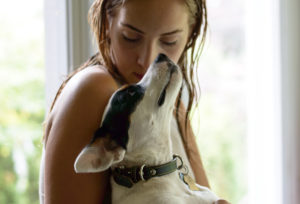
Being a Good Pet Parent
 You know that your pet is good to you.
You know that your pet is good to you.
Sure, there is the occasional “oops” on the carpet or the shoes that were just too tempting, and we won’t even mention the box of croissants that disappeared off the table or the backyard “landscaping”. But your pet is always there for you, and is the best friend a human can have. So, are you being the best friend a pet can have?
Here are some Good Pet Parenting Guidelines –
- Be Observant!
There are several ways to be a Good Pet Parent, but one of the most important is to pay close attention to any changes in habits or behavior.
This is especially important when it comes to pet health, as information from pet owners contributes greatly to the diagnosis and treatment of ailments. The valuable observations that you share with your vet are extremely helpful and can save time in getting your pet the attention it needs.
 Give Them Space
Give Them Space
Pets need a place of their own where they can feel safe and comfortable.
Make sure that it is a relatively quiet space free of household chemicals or contaminants.
Get a pen or kennel, and you’ll be appealing to a dog’s cave dweller instinct.
- Consistently Train
Dogs operate from instinct and memory. Proper training takes consistency and patience, something we humans could practice more! Consistent training produces results. Occasional reprimands, not so much. It’s also a good idea to research the breed of your dog, as that can have an impact on effective training techniques. As for cats, don’t even try.
 Exercise Regularly
Exercise Regularly
Developing a regular exercise routine is a great idea for both humans and pets. It gives dogs a routine that they crave, and allows for quality time together. Make it a playful and fun workout.
- Feed a Healthy Diet
Nutrition plays a huge role in pet health, so choose a good quality food that suits your pet’s taste and needs. With so many options in the marketplace today, virtually all special dietary requirements can be satisfied while supplying healthy nutrition. “People food” is just that – for people, and not for pets. Conditions like Pancreatitis and even allergic reactions can come from feeding table scraps.
Also, keep feeding area clean, with not only clean water, but clean dishes free of bacteria and contaminants.
 Microchip!
Microchip!
On average, 1 in 3 pets goes missing in its lifetime. A microchip the size of a grain of rice goes beneath the skin and is a permanent ID that can reunite you with your missing pet. It’s also wise to have your pet fitted with a sturdy collar and easy to read ID tag.
- Brush Up on Grooming
Get pets accustomed to brushing while young, and make it a habit. Not only will you clear out knots and debris along with loose fur, but brushing gives you a chance to check for any changes, like swelling or lumps and bumps that weren’t there before.
Along with the dreaded bath, fur and nail trims should be part of your pet’s grooming regimen.
- Get Your Pet to the Vet
In addition to keeping up with vaccinations, pets should have an annual physical exam with blood test, chemistry screen and a fecal test to check for worms and parasites that are invisible to the eye. Teeth and mouth health should also be checked during the vet visit.
An annual heartworm test should be part of the visit as well. Even if your pet hasn’t traveled to mosquito country, a mosquito that has bitten a contaminated animal can infect yours with a single bite. After testing, administer a monthly preventative chew, like Heartgard, for reliable protection.
- Get The Message
Know the signals of stress that your pet is sending your way.
Scratching, Licking and Chewing
Compulsive licking can be a sign of anxiety or something more serious, like skin irritations or allergies.

Offering a Paw
While dogs often use a paw to get attention, a raised paw can also be a sign of physical discomfort. A thorn, stone or even foxtail stuck in the foot pad can hamper movement. So can extremely cold or hot walking surfaces. When an entire leg is hitched up, it can signal an orthopedic issue or back problem.
Lethargy
Lack of energy can be symptomatic of something as simple as over-exhaustion or sore muscles from exercise, or it can signal a bigger issue, as lethargy is often associated with illness. Check weight and diet as well, since extra pounds can strain a pet’s body.
 So, to be a good Pet Parent, feed your pet well, exercise regularly, spend time on effective training techniques, maintain a grooming regimen, make sure your pet is ID’d, visit the vet regularly…and Pay Attention, especially when your pet is trying to tell you something!
So, to be a good Pet Parent, feed your pet well, exercise regularly, spend time on effective training techniques, maintain a grooming regimen, make sure your pet is ID’d, visit the vet regularly…and Pay Attention, especially when your pet is trying to tell you something!
A vigilant Pet Parent is a pet’s best friend on the path to health and wellness for life!





